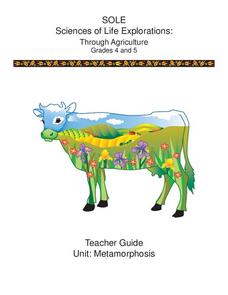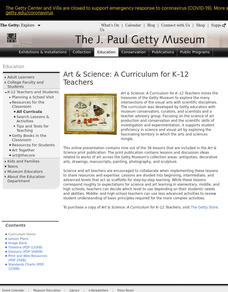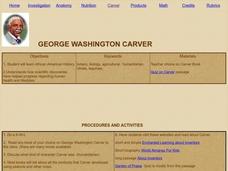Sargent Art
Protect Our Marine Life
Encourage water conservation and boost art skills with a hands-on activity that challenges young painters to create a scene highlighting marine life. Using oil pastels, scholars draw an underwater scene and write a tip for viewers to...
Curated OER
Butterfly Life Cycle
Focused little scientists will flitter their arms back and forth across the room with excitement as they learn the life cycle of a butterfly and how living things grow and change over time.
Cornell University
Metamorphosis
Looking for an insect unit that addresses multiple skill strategies? Young entomologists explore multiple life cycles of insects that go through metamorphosis. The brainteasers and mobile activity spark learner interest before guiding...
Ed Migliore
Linear Equations in Two Variables
This traditional textbook style unit includes vocabulary, a direct explanation section, examples, practice problems that directly line up with the explanations and examples, and a unit summary review and practice problems. Learners get...
Curated OER
Salmon Life Cycles
Learners list salmon life cycle stages in order, list three threats that salmon face throughout their lives, and examine important role native fish play in aquatic food chains throughout their life cycles.
Society of Petroleum Engineers
Renewable and Nonrenewable Energy
Energize an environmental science unit on natural resources with this collection of instructional materials. From simple coloring sheets for primary grade children, to guiding questions for a high school research report, a wide variety...
Curated OER
Life With Energy
Students consider different forms of energy. In this energy lesson, students investigate different forms of energy. Students explore the advantages and disadvantages of these forms of energy.
Northwest High School Science
Metric Conversion: Stair-Step Method
Elevate young scientists' skills with unit conversion using the stair-step method. Detailed instructions and a neat stair-step diagram are on the first page. Four pages of practice problems follow, mostly with real-world applications....
Curated OER
Life in a Log
Students identify insects living in rotting logs. In this decomposition lesson, students observe pieces of a rotting log, they look at the insects that have inhabited the log and create a chart that shows their findings.
Curated OER
Crickets Guided Discovery
Sixth graders investigate insect anatomy by analyzing a live cricket. For this insect science lesson, 6th graders discuss their knowledge of insects and describe their characteristics from memory. Students observe live crickets in...
Curated OER
Marshland Ecosystems
Students identify animals in ecosystem depicted on 16th Century ceramic basin and classify them as herbivores, carnivores, or omnivores based on physical characteristics and prior knowledge, determine which life forms in ecosystem are...
Curated OER
Clearly Classified
Young scholars review the classification system for living organisms and apply it the classification of insects and flowers in the still life by Ambrosius Bosschaert. They create a chart classifying the animals and plants in the painting...
Curated OER
The Mystery of the Missing Hummingbirds
Students record scientific observations in a science journal. In this season instructional activity, students make observations about each of the seasons and record in their journals. Students record organisms response to seasonal...
Curated OER
Are You One Of Us?
Students discover how to classify things based on their similarities and differences. Students give the characteristics of insects and create a classification list. Given examples of various types of insects, students classify them...
Curated OER
Which Bear?
Students study bears. In this science lesson, students compare black, grizzly and polar bears. Students measure the bear tracks and compare the bear habitats and diet.
Curated OER
Garbage in the Garden
Students create their own compost. In this soil lesson, students fill a bag with waste and soil, in order to create a mini compost bin. Students observe the baggies over a 6 week period, they record their findings and collect data on...
K5 Learning
Changes
You can't unring a bell, but can you unmelt an ice cube? Readers consider reversible and irreversible changes with a short informational reading passage and accompanying comprehension questions.
Curated OER
School Forest
Sixth graders explore the concept of biodiversity. In this biodiversity lesson, 6th graders discover a variety of planets and animals that live in forests, and how a rotting log benefits that environment. Students also locate seven...
Curated OER
The Changing Times of The Future
First graders share their wishes for the future and discuss changes that have taken place. They observe a puppet who describes life in the future and identifies positive and difficult challenges he may face. Individual students draw a...
Curated OER
Children's Literature Across the Curriculum Ideas-The Very Hungry Caterpillar
Students read The Very Hungry Caterpillar by Eric Carle. They complete a variety of cross-curricular activities surrounding the study of caterpillars. Included are reading, art, math, science, writing, social studies, and library...
Education World
Predicting Pumpkins
If you want more pumpkin seeds, you should get a bigger pumpkin—right? Young harvesters use estimation skills to make a hypothesis about how many seeds they will find in a pumpkin before examining the real number inside.
Curated OER
Safari Sentence Scramble
Students use real life experiences for writing. In this identifying details lesson, students use information such as colors, numbers, sizes, shapes and locations to write sentences about the zoo. Students position the words from left...
Curated OER
George Washington Carver
Young scholars learn and research the life of George Washington Carver. In this historical figures lesson plan, students read a book on George Washington Carver, discuss his character and the challenges he faced in becoming a botanist. ...
Curated OER
If At First You don't Succeed Try, Try Core Knowledge!
Students relate phrases and sayings to their life experiences. In this phrases and sayings lesson, students participate in activities and listen to stories to understand the meanings of each saying. One day is devoted to each saying.
Other popular searches
- K 2 Life Science Growth
- K 2 Life Science Living
- K 2 Life Science Insects
- K 2 Life Science Salamander
- K 2 Life Science Hibernation
- K 2 Life Science Adaptation
- K 2 Life Science Cells
- K 2 Life Science Nonliving
- K 2 Life Science Wind

























